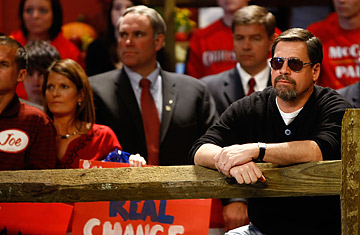
Mark Salter, right
The morning after John McCain's defeat, Mark Salter, McCain's closest aide and biographer, sipped coffee in the courtyard of the Biltmore Resort and Spa while explaining why the national political press had assisted Barack Obama. "On top of everything, we had a thumb on the scale," he said, referring to the media's role in refereeing the campaign. "It wasn't right, but it was what it was." (See pictures of John McCain's campaign farewell.)
Salter argued, as he has for weeks in private conversations, that the press was skewed for several reasons. "McCain was the story they had covered. He was a 2000 news story," Salter said, while Obama was the new guy. He said the press was also swayed by the possibility of America electing its first black President, who could get the country "past the old racial baggage we have lugged around for so many years." "I understand that appeal," Salter continued, sounding neither bitter nor upset. "I think McCain probably, as you can tell from his speech last night, felt part of that a little himself. And I think that required the press, then, to start rationalizing McCain into something he wasn't."
Hear Mark Salter discuss McCain's defeat:
McCain's top aide rejected outright the notion that McCain had been changed by former handlers of President George W. Bush, like Steve Schmidt, the McCain strategist who had worked with Karl Rove in 2004. "This sort of Maureen Dowd nonsense, comic-book theorizing about the Bushies who hijacked McCain — she can never write a serious column," he said of the New York Times columnist. "It's just nonsense. Everybody, everybody felt a personal responsibility to protect McCain's reputation."
The changes to how McCain campaigned were forced by the press, Salter argued. "The fact that we didn't do the back-of-the-bus stuff is only a function that you guys really wouldn't let us," Salter said, referring to the media. "Once the cameras demanded to be there, it became, What can McCain say that we can circulate on the hour and embarrass the s___ out of him? So he just couldn't do it, and it wasn't a Bush hijacking or anything, it was recognizing reality. We were being mocked by the meta-narrative writers for being undisciplined, lacking a single central message."
Salter said that McCain would have preferred to campaign in the general election in the same way he campaigned in New Hampshire, but that the press and Obama made that impossible. "I think if we had gotten 10 town halls out of Obama," Salter said, "it would have come close to that. McCain's ideal as a general would have been flying around on an airplane with Barack Obama, debating in town halls and having dinner with him afterwards." (See pictures of Barack Obama's campaign behind the scenes.)
Most of all, Salter repeatedly praised McCain, a man for whom he has worked for 19 years, and for whom he has boundless respect. He recalled traveling with McCain to Iowa and New Hampshire after his campaign collapsed in 2007 under the weight of mismanagement and poor fund-raising. "There was nothing except a mental and emotional confidence — this is what I set out to do, and I will do this. And if I fail, I fail — but no one will tell me I failed until I have," Salter said. "That must be kind of a glimpse of a kind of emotional toughness that got him through Vietnam. He is just way above average."
